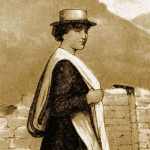I. Springing Jack
Green wooden leaves clap light away,
Severely practical, as they
Shelter the children candy-pale,
The chestnut-candles flicker, fail . . .
The showman’s face is cubed clear as
The shapes reflected in a glass
Of water—(glog, glut, a ghost’s speech
Fumbling for space from each to each).
The fusty showman fumbles, must
Fit in a particle of dust
The universe, for fear it gain
Its freedom from my cube of brain.
Yet dust bears seeds that grow to grace
Behind my crude-striped wooden face
As I, a puppet tinsel-pink
Leap on my springs, learn how to think—
Till like the trembling golden stalk
Of some long-petalled star, I walk
Through the dark heavens, and the dew
Falls on my eyes and sense thrills through.
II. The Ape Watches “Aunt Sally”
The apples are an angel’s meat;
The shining dark leaves make clear sweet
The juice; green wooden fruits alway
Fall on these flowers as white as day—
(Clear angel-face on hairy stalk:
Soul grown from flesh, an ape’s young talk!)
And in this green and lovely ground
The Fair, world-like, turns round and round
And bumpkins throw their pence to shed
Aunt Sally’s wooden clear-striped head.—
I do not care if men should throw
As bright as gold and silver pence . . .
They cannot drive their black shade hence!

















Comment form: